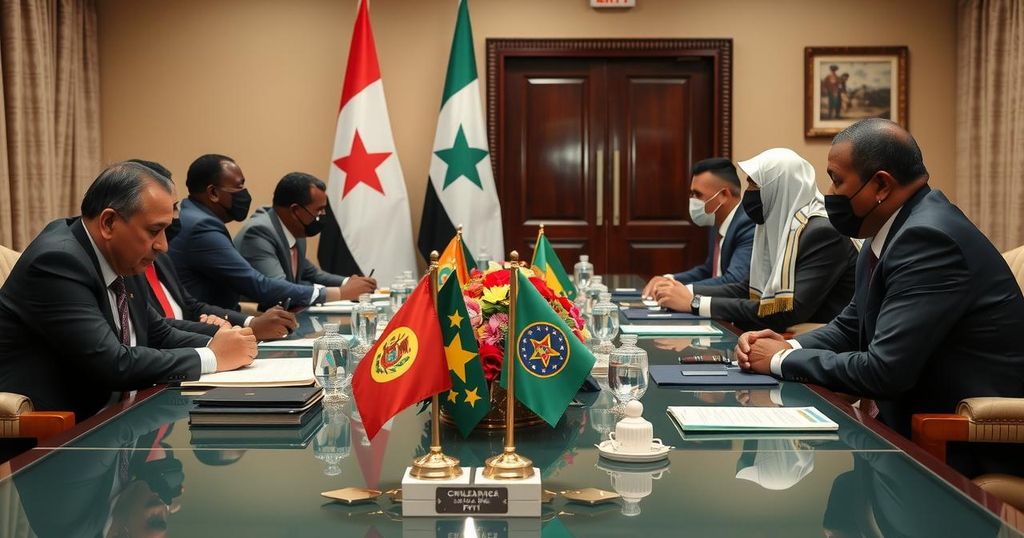Geopolitical Tensions: Ethiopia Seeks Change in Somalia’s Foreign Leadership

Ethiopia seeks to replace Somalia’s Foreign Minister Ahmed Fiqi, facing opposition from Egypt as President Hassan Sheikh Mohamud visits Ethiopia to restore diplomatic ties. Fiqi’s absence raises worries about strained relations with regional states. The dynamics reflect a broader geopolitical rivalry in the Horn of Africa, complicating Somalia’s foreign policy amid external influences.
The ongoing political dynamics in the Horn of Africa have intensified recent developments involving Somalia’s Foreign Minister, Ahmed Fiqi. Reports indicate that Ethiopia seeks to replace Mr. Fiqi, facing staunch opposition from Egypt. Amidst this backdrop, Somali President Hassan Sheikh Mohamud visited Ethiopia, where he was warmly received by Prime Minister Abiy Ahmed, signaling a restoration of diplomatic ties. However, notably absent from this crucial meeting was Foreign Minister Fiqi, who is currently in Egypt participating in discussions that aim to solidify a trilateral alliance with Egypt and Eritrea against Ethiopia’s influence.
This shift in diplomatic focus raises concerns regarding ongoing tensions between Somalia’s federal leadership and its regional member states, particularly Puntland and Jubaland, which maintain strong ties with Ethiopia. The strained relations have led some observers to interpret President Mohamud’s engagement with Ethiopia as a strategy to diminish these regional alliances. Historically, Ethiopia’s interactions with Puntland and Jubaland have been vital in countering regional security threats. Furthermore, the inclusion of Ethiopian troops in Somalia’s restructured African Union peacekeeping force underscores Ethiopia’s significant role in Somalia’s security framework.
The geopolitical struggles within the Horn of Africa are exemplified by Egypt’s resistance to the proposed replacement of Foreign Minister Fiqi, as Cairo firmly views its alliances with Somalia and Eritrea as counterbalances to Ethiopian influence. Past instances, such as the dismissal of former Somali intelligence chief Mahad Salad for perceived alignment with Egyptian interests, suggest a precarious balance for Somali officials amid these external pressures. Critics have been increasingly vocal regarding President Mohamud’s foreign policy, describing it as inconsistent and driven by personal rather than national interests, potentially compromising Somalia’s sovereignty and stability as it navigates these complex geopolitical waters.
In the Horn of Africa, the relationship dynamics among Ethiopia, Egypt, and Somalia have historically shaped regional security strategies and diplomatic engagements. Ethiopia has long maintained strong ties with certain Somali federal member states, like Puntland and Jubaland, which complicates the diplomatic landscape amid new leadership in Somalia. As regional players, both Egypt and Ethiopia engage in a geopolitical rivalry that influences their foreign policies toward Somalia, especially in light of Somalia’s ongoing recovery from conflict and efforts to establish a stable government.
The political maneuvering surrounding Somalia’s foreign minister highlights the intricate relationships between regional powers in the Horn of Africa. As Ethiopia and Egypt vie for influence in Somalia, the implications for regional stability and Somalia’s internal governance remain profound. The ongoing scrutiny of President Hassan Sheikh Mohamud’s foreign policy underscores the challenges faced by Somalia as it balances external pressures against its need for sovereignty and effective governance.
Original Source: www.garoweonline.com








